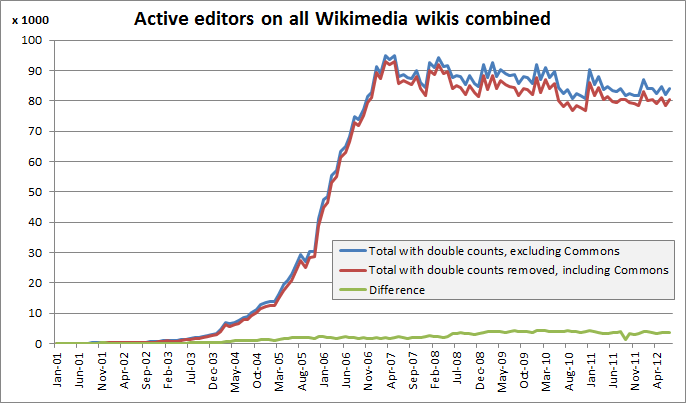We are making a change to our active editor metric to increase accuracy, by eliminating double-counting and including Wikimedia Commons in the total number of active editors. The active editors metric is a core metric for both the Wikimedia Foundation and the Wikimedia communities and is used to measure the overall health of the different communities. The total number of active editors is defined as:
the number of editors with the same registered username across different Wikimedia projects who made at least 5 edits in countable namespaces in a given month and are not registered as a bot user.
This is a conservative definition, but helps us to assess the size of the core community of contributors who update, add to and maintain Wikimedia’s projects.
The de-duplication consists of two changes:
- The total active editor count now includes Wikimedia Commons (increasing the count).
- Editors with the same username on different projects are counted as a single editor (decreasing the count).
The net result of these two changes is a decrease of the number of total active editors averaging 4.4% over last 3 years.
De-duplication of the active editor count only affects our total number of active editors across the different Wikimedia projects, the counts within a single project are unaffected. We’ve also begun work on a data glossary as a canonical reference point for all key metrics used by the Wikimedia Foundation.
Background
The total number of active editors across all our projects gives us a good sense of the vibrancy and health of our overall community. As can be seen above, while the total number of editors shows a slight decline, it is relatively stable; there’s a more pronounced decline in mature projects like the English Wikipedia, which is somewhat offset by other nascent language communities.
The total number of active editors has historically been calculated simply by summing up the numbers from individual projects, like the various language versions of Wikipedia and our other projects. This means that an editor who is active in more than one language or project is double-counted.
To ensure that this double-counting doesn’t distort the numbers too much, in August 2010, we began excluding Wikimedia Commons from the total count. Wikimedia Commons is the media repository (photos, sounds, video, illustrations) used by all Wikimedia projects, and users typically contribute to it as part of their editing activity on another project.
This has begun to change with projects like Wiki Loves Monuments, which drive thousands of new contributors to Wikimedia Commons who may have never contributed to other Wikimedia projects.
In order to increase the accuracy of our total active editor estimate, our data analyst Erik Zachte has revised his code to treat all users with the same username as the same person (which is a sufficiently robust assumption for this purpose). Accordingly, we have revised the metric of “total active editors” to also include Commons, since double-counting should no longer occur.
The result is an overall decrease of the measured number of total active editors by approximately 4.4% on the average for any given month during the past three years (see comparison of new and old numbers below).

The new numbers are now published in the following locations:
- the Wikimedia report card, which is the canonical monthly publication of core metrics for Wikimedia projects;
- the Wikimedia stats for all projects report, which (in the column “5” for 5 edits) is the raw data source for the report card;
In addition, the project-level summary statistics for active editors (columns >5 and >100) are now also de-duplicated (e.g. active editors on Wikipedia).
If you find a metric missing in our data glossary or you have any other data / analytics related question, then please let us know! Or consider joining the Analytics mailing list or #wikimedia-analytics on Freenode (IRC). And of course you’re also very welcome to send me email directly.
Best regards,
Diederik van Liere, Product Manager Analytics
2012-08-31: Edited to fix broken anchor link

Can you help us translate this article?
In order for this article to reach as many people as possible we would like your help. Can you translate this article to get the message out?
Start translation